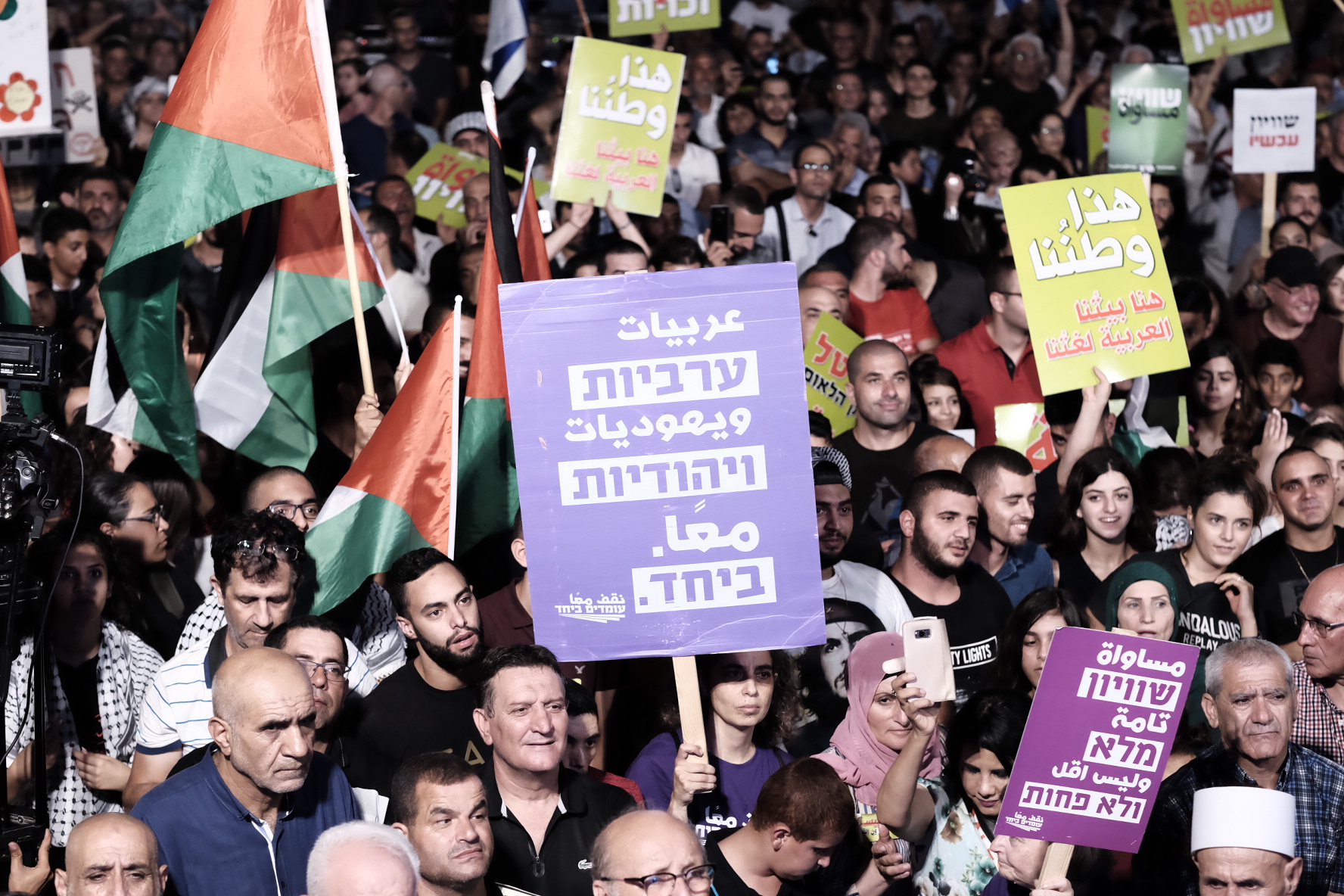For the second consecutive week, Tel Aviv’s Rabin Square was the site of a Saturday-night protest against Israel’s nation-state law. But the difference between the two demonstrations speaks volumes about the nature of the debate over the controversial legislation.
In the first, reportedly tens of thousands of Jewish Israelis showed up in the iconic plaza to join members of Israel’s Druze community. The protesters expressed their outrage about the Knesset’s vote to pass a bill that reaffirmed the notion that the country is a Jewish state, albeit without also including language about equality and democracy—principles that are guaranteed in other basic laws that make up the country’s makeshift constitution.
In the second, tens of thousands gathered for the same purpose. But the event, which was organized by the Arab Higher Monitoring Committee, had a different tone and was marked by the absence of members of Israel’s leading opposition parties who were there the previous week.
Their reluctance to join with the Arab Committee was criticized by Israeli Arabs and some on the country’s far-left who argued that the attitude of leaders of the Yesh Atid and Zionist Union (Labor) parties showed they subscribed to a tiered approach to Israeli citizenship in which Jews were at the top, Druze in the middle and Arabs at the bottom.
But the reluctance of much of the opposition outside of the ultra-left wing Meretz Party, which did show up at the Arab protest alongside members of the openly anti-Zionist Arab Joint List, to attend the second demonstration was vindicated when some people waved Palestinian flags and chanted slogans such as “With blood and fire, we will redeem Palestine” and “Million of martyrs are marching to Jerusalem.” That made it quite clear that the goal wasn’t so much equality or democracy, but the demise of Israel.
Yesh Atid Party leader Yair Lapid, who will likely be the leading alternative to Israeli Prime Minister Benjamin Netanyahu in the next Israeli election, made the point succinctly when he wondered on Twitter what would happen to anyone who waved Israeli flags in Ramallah the way the demonstrators had flaunted their allegiances in Tel Aviv. But despite Lapid’s pointed absence from the Arab protest, it appears that the Saturday rally was a political gift to Netanyahu since it allowed him to depict objections to the nation-state bill as somehow in sympathy with the war against Israel.
Whether or not you think that’s fair, the Arab protest nevertheless illustrated why so much of the debate about the nation-state law is wrongheaded.
Contrary to the hype from the critics, the claims that it changes anything about the way Israel is governed are utterly false. Druze and Arab citizens of Israel still have equal rights under the law that aren’t in jeopardy.
But the law does remind everyone of something that shouldn’t be controversial, yet still angers both non-Jewish minorities and those Diaspora Jews who oppose any state that isn’t avowedly secular. Namely, that the primary purpose of Israel is to give expression to the right of the Jewish people to self-determination in their ancient homeland. Or at least, it isn’t controversial unless you think that the Jews are the only people who should be denied such rights when dozens of other countries similarly constituted aren’t subject to siege or boycotts. The outrage that this law has provoked is not so much a discussion about how citizens of Israel should be treated, but whether or not the basic purpose for which the nation was created is legitimate.
Most Israelis deeply sympathize with the small Druze community because they serve in the Israeli Defense Forces. All the law did, however, was to point out to them the anomalous position of even the most loyal minority group in a country dedicated to the national ambitions of the majority. This requires a degree of delicacy and concern for the needs of the Druze that the government has often lacked.
But with respect to Arab Israelis, the conflict is not as much about sensibilities as it is a dispute for which there is no solution. The Arab Higher Monitoring Committee has long been on record as opposing Israel’s status as a Jewish state, even if it is also explicitly democratic with equal rights guaranteed to minorities, as is currently the case. The same is true of the Arab Joint List that has 13 seats in the Knesset. It is a coalition of four parties (the largest of which advocates communism) and its members oppose Israel’s existence as a Jewish state under any circumstances.
That means that unless you’re willing to eschew the most anodyne of the provisions of the Jewish state bill, such as the blue-and-white flag, the menorah symbol, the Hebrew calendar and language, Jewish holidays and the right of Jews to immigrate, there’s no way to satisfy such critics.
So while Netanyahu’s detractors, including a loud chorus of American Jews, continue to insist that while they have no problem with Israel being a Jewish state but worry that he is sabotaging its democracy, the protests illustrate that something very different is at stake here.
The motivation for passing the law may have had to do with coalition politics. But given the demands of the Arabs and the worldwide BDS movement, it is precisely those non-controversial aspects about the law that are the most controversial to those who would deny the Jews a state. Under these circumstances, it’s no wonder that polls show a decisive majority of Israelis favor the law.
Those Palestinian flags and chants may have altered the debate in Israel. American Jews who support Israel but don’t like Netanyahu, or who worry about the status of minorities there, should also take notice and draw the appropriate conclusion from what the law’s opponents are saying, demanding—and doing.


























